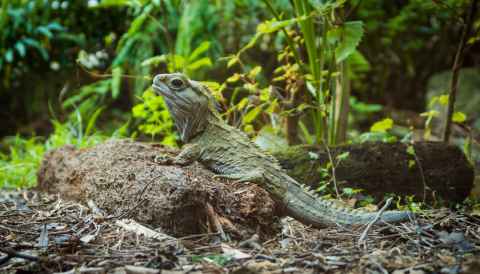Inside tuatara tummies
18 December 2024
What can gut bacteria tell us about this ancient species?

Small but mighty is one way to describe the tuatara. Found only in Aotearoa New Zealand, it is the lone survivor of the Rhynchocephalia order of reptiles, which once walked with dinosaurs more than 200 million years ago. Despite being eradicated from the mainland with the arrival of rats, this resilient species managed to survive on 32 small offshore islands, and lives in the wild on more than this today. Successful conservation efforts including the creation of pest-free sanctuaries like Wellington’s Zealandia have seen the population recover to between 60,000 and 100,000.
Since 2022, Carmen Hoffbeck has been examining the tuatara’s gut microbiome for her PhD at the University of Auckland, with support from the James Fawcett New Zealand Herpetofaunal Postgraduate Research Award. Hailing from the USA, she earned her Bachelor of Science at Oregon’s Linfield College and Master of Science at California State University, Northridge. For the latter, she focused on host-microbiome relationships in legumes, and in 2020 visited New Zealand on a Fulbright Scholarship. Here she met the Faculty of Science’s Professor Mike Taylor, who invited her to return for a PhD.
Now in her third and final year, Carmen is a wealth of knowledge on tuatara – and their tummies. “I look at the bacteria that live in the tuatara gut, whether that is consistent across sanctuary sites and in captivity, and how robust it is to seasonal and dietary change,” she explains. To gather data, she spent a summer catching and swabbing tuatara around the motu, including at Dunedin’s Orokonui Ecosanctuary and the Waikato’s Sanctuary Mountain Maungatautari.
At dusk, she would venture into the bush, listen for rustling, then gently scoop up the tuatara. Using what looks like a Covid-19 nasal swab, she took samples from the cloaca – the opening located under the base of the tail – before releasing the creature. It’s given her a greater appreciation for the reptiles. “I find them extremely charming. The iwi see them as kaitiaki, because they're so stoic and knowledgeable. They have a reputation in mythology of being an ancient guardian, and when you look at them, you definitely get that impression. They’re very impressive animals. They're also very feisty!”

Back in the lab, Carmen performed a DNA extraction, then had the DNA sequenced to identify the species of bacteria present. The results have shed new light on just how unique the tuatara is: it lacks Salmonella and has very few Bacteroides – both of which are common in most reptiles – and also contains significant quantities of unidentified bacteria species. “I found a really unique bacterial community, including bacteria that may never have been seen before outside of tuatara.”
The study also showed that current conservation methods, which consist of translocation and captivity, aren’t negatively impacting the tuatara microbiome. “My main findings have been that the tuatara gut is really robust; it doesn't seem to shift much over spatial or temporal distance,” Carmen explains. “We found that even tuatara in the zoo have similar gut communities to those in the wild and at Zealandia. It’s reassuring that Aotearoa’s conservation approach is not having an adverse effect.”
This gives conservationists confidence to continue moving tuatara as the effects of global warming intensify. “With climate change, we can probably expect more translocations,” Carmen says. “Tuatara are cold-adapted reptiles; they're very sensitive to warm temperatures for sustained periods. If I have them in my hand, I have to worry about overheating them. Up north, temperatures are warmer, so we may need to move them to the cooler temperatures to protect them from heat stress.”
Carmen is honoured to have been awarded the James Fawcett New Zealand Herpetofaunal Postgraduate Research Award in 2022, 2023 and 2024. James was a passionate herpetologist who studied at the University of Auckland before becoming a lecturer at the University of Nebraska, USA. He spent much of his life cataloguing literature references of New Zealand’s herpetofauna and had a special interest in the tuatara. The award is generously supported by James’s wife, Georgene Fawcett, and acknowledges students dedicating their research to New Zealand’s native reptiles and amphibians. “Being awarded this multiple times is very meaningful. It demonstrates the importance of the work, and it means that I'm carrying on James’s vision for herpetology in New Zealand,” she says, adding that the support made her field work possible.
The more people that become invested in the tuatara and its well-being, the better, says Carmen. And if her appearances on RNZ, Te Ao Māori News and bFM Radio are anything to go by, there is clear public interest in this taonga species. “Although conservation is really valued here, I think people assume it's in hand now. But it’s still a dire situation for many species, and with climate change, it's going to become more dire. The more we care about these animals and recognise how important they are to Aotearoa, the more funding can be allocated.”
Media Contact
Helen Borne | Communications and Marketing Manager
Alumni Relations and Development
Email: h.borne@auckland.ac.nz